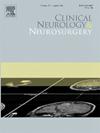影响 Moyamoya 病成年患者颞浅动脉侧枝生长的因素。
IF 1.6
4区 医学
Q3 CLINICAL NEUROLOGY
引用次数: 0
摘要
背景:有多种因素被认为会影响颞浅动脉(STA)血管在脑-室-动脉-同步血管形成术(EDAS)后的生长:这项回顾性单中心分析纳入了2013年1月1日至2023年12月31日期间接受EDAS治疗的Moyamoya病(MMD)患者。评估变量包括人口统计学特征、临床表现、技术细节、改良Rankin量表(mRS)评分和放射学结果。研究人员进行了单变量和多变量分析,以确定有利于STA络脉生长的因素:40名MMD成年患者接受了56次EDAS检查,其中女性患者居多(77.5%),中位年龄为48岁。最常见的首发症状是缺血性事件(75.0%),其次是出血性事件(27.5%)和癫痫发作(7.5%)。术后中位 13.7 个月时进行的数字血管造影显示,78.6% 的病例出现了 STA 侧支生长,35.7% 的血管再通半球达到了松岛 A 级。单变量分析显示,术前 STA 直径较大(P=0.035)、铃木分级较高(P=0.021)和血管造影随访时间较长(P=0.048)的患者侧支较多。颈内动脉(ICA;P结论:ICA和ACA闭塞患者的血管随访时间更长:ICA和ACA闭塞与EDAS术后的成功率有关。单变量分析显示,随访时间越长、STA越大的患者与EDAS的成功率越相关,但在调整了其他手术特征后,两者的相关性降低。本文章由计算机程序翻译,如有差异,请以英文原文为准。
Factors affecting the collateral ingrowth from the superficial temporal artery after Encephalo-Duro-Arterio-Synangiosis in adult patients with Moyamoya disease
Background
Multiple factors have been proposed to affect the vessel ingrowth from the superficial temporal artery (STA) after Encephalo-Duro-Arterio-Synangiosis (EDAS).
Methods
This retrospective single-center analyses included patients with Moyamoya Disease (MMD) undergoing EDAS from January 1st, 2013, to December 31st, 2023. Evaluated variables included demographic characteristics, clinical presentation, technical details, modified Rankin Scale (mRS) scores, and radiographic outcomes. Univariate and multivariate analysis was performed to identify factors favoring the ingrowth of collaterals from the STA.
Results
Forty adult patients with MMD, most commonly females (77.5 %) with a median age of 48, underwent 56 EDAS. The most common initial presentations were ischemic events (75.0 %), followed by hemorrhagic events (27.5 %) and seizures (7.5 %). Digital angiography performed at a median of 13.7 months post-procedure revealed collateral growth from the STA in 78.6 % of cases, with a Matsushima grade A identified in 35.7 % of the revascularized hemispheres. Univariate analysis showed more collaterals in patients with a larger preoperative STA diameter (p=0.035), higher Suzuki grades (p=0.021) and longer angiographic follow-ups (p=0.048). Patients with occlusion of the internal carotid artery (ICA; p<0.01), middle cerebral artery (MCA; p<0.01), or anterior cerebral artery (ACA; p<0.01) also had more collateral ingrowth. Multivariate analysis revealed that ICA occlusion (OR=6.54; 95 % CI=1.03–41.48) and ACA occlusion (OR=6.52; 95 % CI=1.02–41.67) as predictors of collateral ingrowth from the STA.
Conclusion
ICA and ACA occlusion were associated with success after EDAS. Longer follow-ups and larger STA demonstrated significant association on univariate analysis, but lost significance after adjusting for other procedural characteristics.
求助全文
通过发布文献求助,成功后即可免费获取论文全文。
去求助
来源期刊

Clinical Neurology and Neurosurgery
医学-临床神经学
CiteScore
3.70
自引率
5.30%
发文量
358
审稿时长
46 days
期刊介绍:
Clinical Neurology and Neurosurgery is devoted to publishing papers and reports on the clinical aspects of neurology and neurosurgery. It is an international forum for papers of high scientific standard that are of interest to Neurologists and Neurosurgeons world-wide.
 求助内容:
求助内容: 应助结果提醒方式:
应助结果提醒方式:


